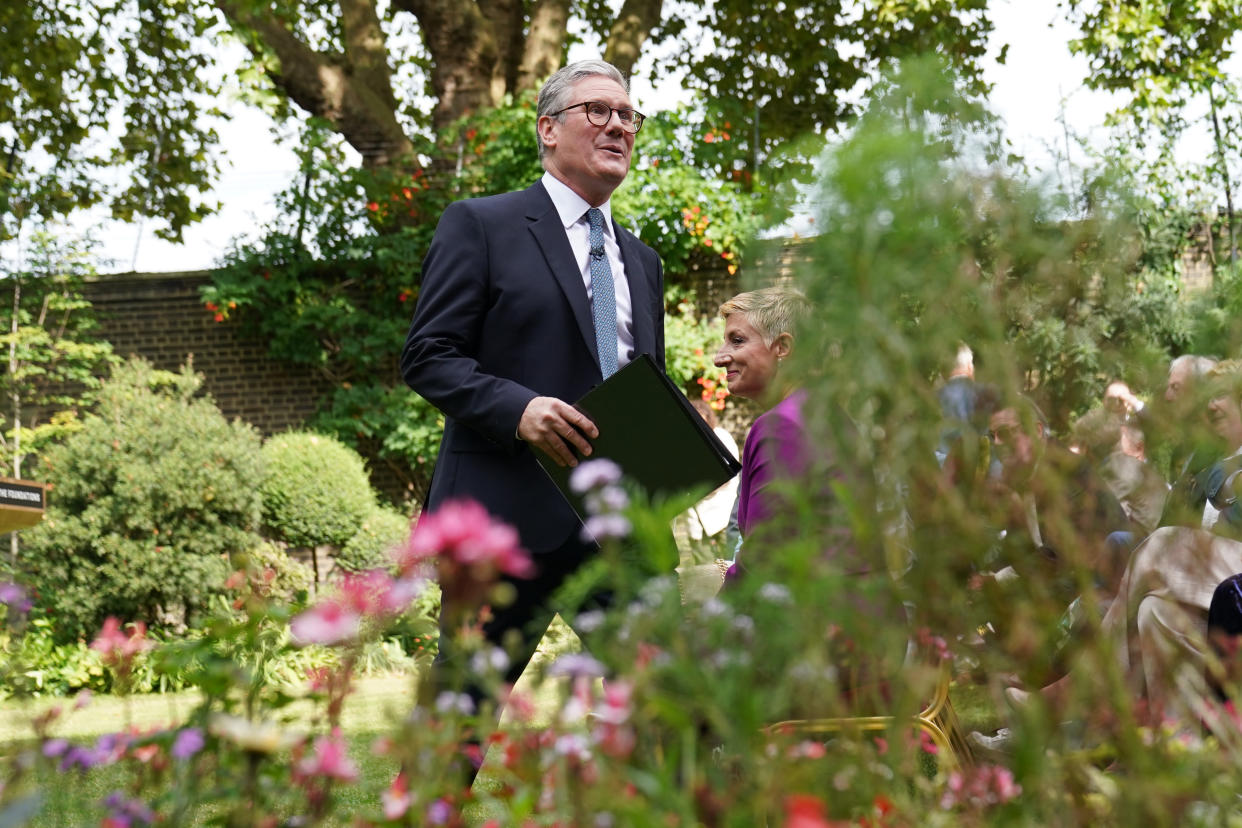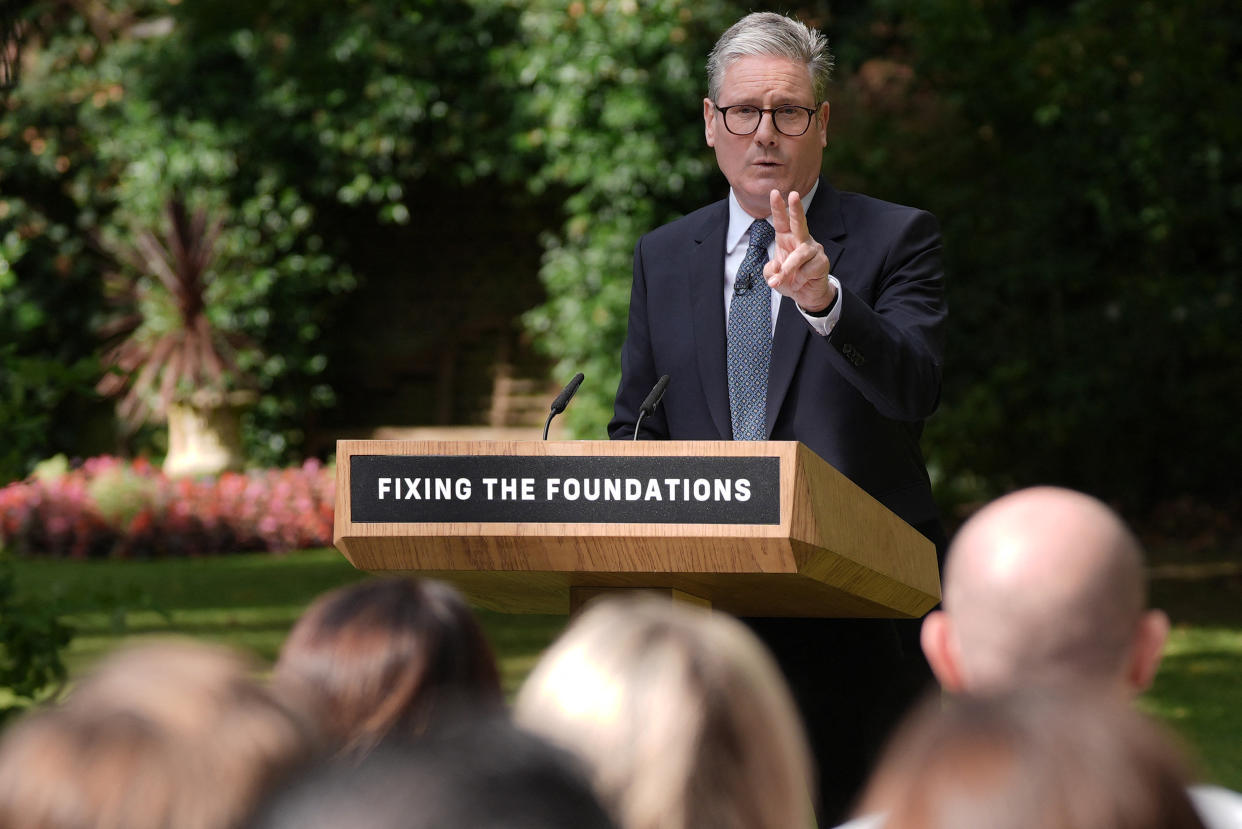Daniel Barker
Paddock Liberal Democrats Learn more
Tories left £22bn black hole in the public finances
by danielbarker on 28 August, 2024
Sir Keir Starmer has warned that his government needs to make some “tough” choices” in the weeks and months ahead, as he asked the public to “accept short-term pain for long-term good”.
In a major speech delivered from the Rose Garden of No 10, the prime minister sought to blame what he presented as an economic mess inherited from a series of Tory governments that left him no choice but to make some “painful” choices, adding:
Things are worse than we ever imagined.
Here are some of the key takeaways from his speech, and the important questions that remain unanswered.
The budget is going to be ‘painful’
While Starmer said he did not want to “pre-empt” chancellor Rachel Reeves over her upcoming budget on 30 October, he did warn it is “going to be painful”.
The PM said that in the first few weeks of Labour getting into power, they had discovered a “£22bn black hole in the public finances” that the Office for Budget Responsibility (OBR) – the independent body that provides economic forecasts and analysis – didn’t know about because the previous government “hid it”.
Even just last Wednesday, we found out that – thanks to the last government’s recklessness – we borrowed almost £5bn more than the OBR expected in the last three months alone.
In a “big ask” to the country, Starmer said he wanted the public to “accept short-term pain for long-term good”, although he did reiterate his pledge on the “triple lock for working people” – meaning no increases in income tax, national insurance or VAT.
Hinting at where some of this extra money could come from, the prime minister said “those with the broadest shoulders should bear the heavier burden”, which is why his government is “cracking down on non-doms”. Other taxes that Labour has not committed to protecting are inheritance tax and capital gains tax.

However, Labour is already coming under fire over its plans to end the universal £300 winter fuel payment for pensioners, reducing the number eligible to receive it from 11.4 million to 1.5 million, saving some £1.4 billion this financial year.
“I didn’t want to means test the winter fuel payment, but it was a choice we had to take,” Starmer said. “A choice to protect the most vulnerable pensioners while doing what is necessary to repair the public finances.”
And in the shadow of this cut, Starmer defended his government’s pay offers to striking junior doctors and rail workers, arguing that “you can’t grow the economy if you haven’t got a basic transport that’s working”.
Simon Francis, coordinator of the End Fuel Poverty Coalition, was also critical:
The Winter Fuel Payment axe is not about rot in the system, it is about basic fairness for older people facing soaring energy bills.
The impact of living in cold damp homes is particularly harsh on those older people with a disability, a long-term health condition or with poor mental health. It results in people turning to an NHS and, in some cases, can result in additional winter deaths.
Ending energy debt, extending the Household Support Fund, expanding Warm Home Discounts and evolving standing charges are all now needed urgently to help mitigate the impact of high bills and the axe to the Winter Fuel Payment.
Riots revealed an ‘unhealthy society’
The series of violent race riots that swept the country following the Southport stabbings “laid bare” the “cracks in our foundation” as a nation, Starmer said.
Suggesting that his Tory predecessors had helped add fuel to the fire, the prime minister said the country had been “weakened by a decade of division and decline”.
“Infected by a spiral of populism, which fed off cycles of failure of the last government,” he said.

Starmer, as he often did during his election campaign, referenced his time as director of prosecutions, suggesting that responding to the riots of 2011 in London and elsewhere was not as hard as dealing with this summer’s unrest due to the UK’s prisons being so overcrowded.
“Not having enough prison places is about as fundamental a failure as you can get. And those people throwing rocks, torching cars, making threats… They didn’t just know the system was broken, they were betting on it,” he said. “They saw the cracks in our society after 14 years of failure – and they exploited it. That’s what we have inherited. Not just an economic black hole – a societal black hole.”
What didn’t Keir Starmer say?
While Starmer presented himself as a straight-talking, no-nonsense leader who could be frank about “tough decisions” lying ahead, he gave little detail away about the upcoming tax and spending plans.
Despite being repeatedly asked by reporters, he did not say what taxes would be raised, beyond his commitment not to increase either income tax, VAT or national insurance – the so-called “triple-lock” Labour made such a prominent part of their election campaign.

“Cracking down on non-doms”, while it may be a crowd pleaser, would have to be put into action in a workable way.
Starmer was also asked if his government would also have to cut public spending to help plug the national finances. The prime minister didn’t answer and said he wouldn’t want to “pre-empt” the Chancellor’s plans for the upcoming budget.
And while he referenced “looking at other allowances” it’s not clear what Labour’s plans could involve.
Asked about plans to change asylum policy and whether the government would expand the number of safe and legal routes into the UK as a means to tackle dangerous Channel crossings, Starmer didn’t address the question.
Editors note: we can see what the problems are, hopefully we will get some solutions soon!
Leave a comment
Leave a Reply